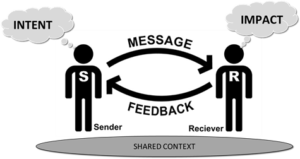WARNING: Your Language May Be Sabotaging Your Message
Language matters.
Words have the power to build people up, confine people to where they are, or break people down.
Consider the impact of your words on your team, your clients, your friends, and your family.

When communicating, there are a few key things to keep in mind: There is a sender who has an intention when sending a message; a receiver who is impacted by the message; feedback that is given to ensure the impact matches the intent; and shared context that supports the communication and creates the setting for the conversation. If shared context doesn’t exist it often means that the message doesn’t make the intended impact.
Here are some language landmines to consider when mentally composing a message:
- “Why” connected with “you” – this word can cause your team to become defensive. It can create the impact of being challenged. Instead of asking, “Why did you fail to complete the status report on time?” what if you said, “Help me understand why the status report was not posted to SharePoint last Friday like we agreed it should be.” It’s a small change to the language but will elicit a completely different response.
- Always and never – these are two words that do not belong in a conversation with or about someone. Saying, “you always” or “you never” demonstrates an unwillingness to see a person as capable of changing. It immediately places someone in the mental game of proving the opposite. Focus on a specific experience or situation rather than generalizing all behavior.
- No – this is a fantastic word when you are setting boundaries or managing your schedule. This is not a good word to use in conversation. The gentle art of improv is a much better way. It’s something that Donna has been working on, saying “yes, and.” This creates connection, bridging what someone has just said to you and building on it. “No” creates a binary conversation. It’s no versus yes, me versus you, right versus wrong. While you may win the argument, you can destroy the relationship. “Yes, and” is a powerful way to engage in a conversation where everyone feels heard.
What words have you found create division instead of connection? Most conversation is about moving something forward, and whether it’s advancing a relationship, a project or an idea, you can’t move forward when you are in a war of words.

